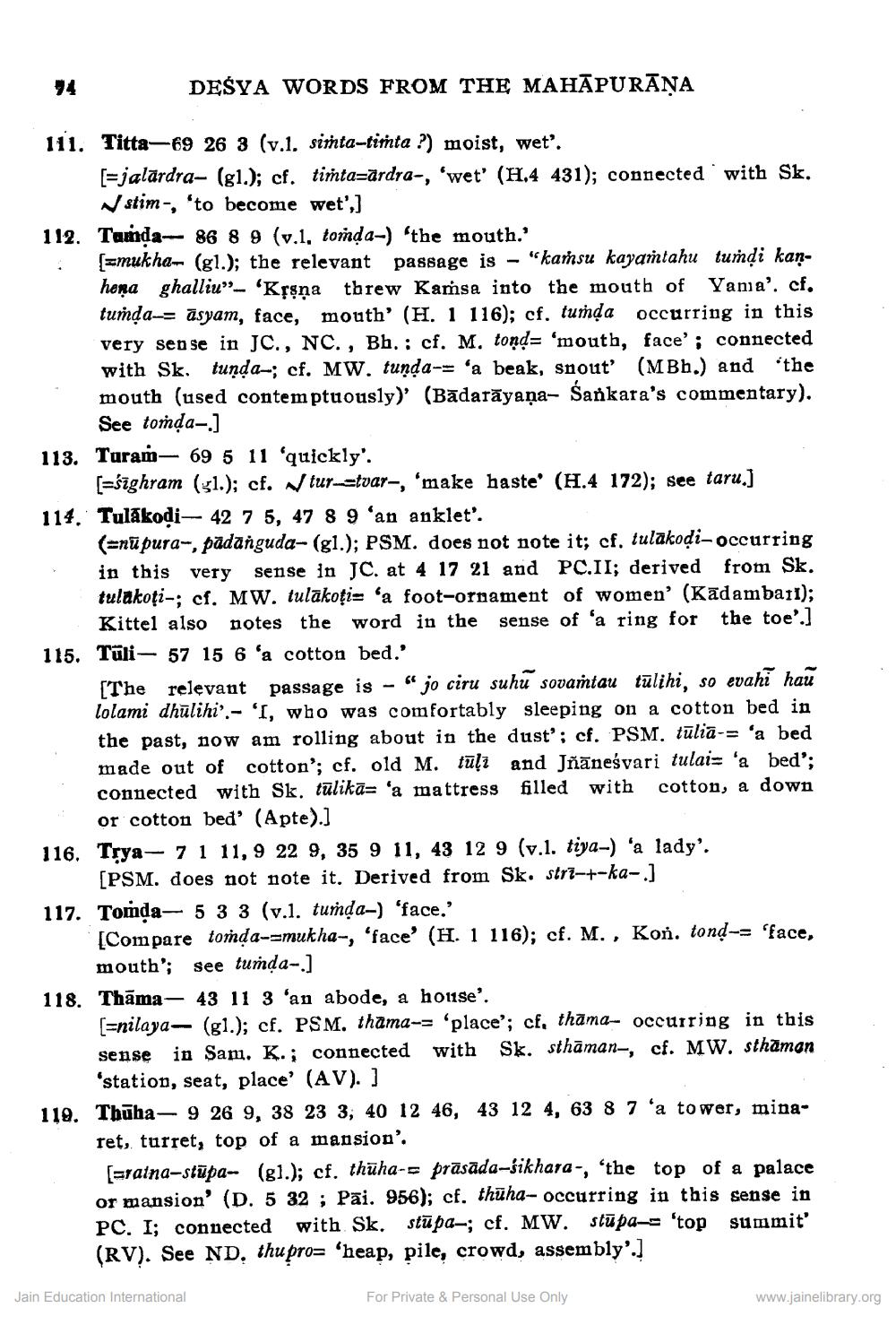________________
DEŚVA WORDS FROM THE MAHĀPURĀŅA
111. Titta—69 26 3 (v.1. simta-timta ?) moist, wet.
[=jalārdra- (gl.); cf. timta=ārdra-, 'wet' (4,4 431); connected with Sk.
stim-, 'to become wet',] 112. Tanda- 86 8 9 (v.1, tonda-) (the mouth.'
(=mukha. (gl.); the relevant passage is - "kańsu kayantahu tundi kanhera ghalliu"- 'Krsna tbrew Kamsa into the mouth of Yania'. cf. tuïda-s āsyam, face, mouth' (H. 1 116); cf. tumda occurring in this very sense in JC., NC., Bh. ; cf. M, toņd= 'mouth, face'; connected with Sk. tunda-; cf. MW. tunda-= 'a beak, snout' (MBh.) and the mouth (used contemptuously)' (Bādarāyaṇa, Sankara's commentary).
See toda-] 113. Turam-69 5 11 'quickly'.
(=śīghram (51.); cf. v tur-tvar-, 'make haste' (H.4 172); see taru.) 114. Tulākodi-- 42 7 5, 47 8 9'an anklet'.
(=nūpura-, padanguda- (gl.); PSM. does not note it; cf, tulakodi-occurring in this very sense in JC. at 4 17 21 and PC.II; derived from Sk. tulakoţi-; cf. MW. tulakoți= 'a foot-ornament of women' (Kadamba11);
Kittel also notes the word in the sense of 'a ring for the toe'.] 115. Tuli - 57 15 6 'a cotton bed.'
[The relevant passage is "jo ciru suhu sovamtau tulihi, so evahi hau lolami dhūlihi'.- 'I, who was comfortably sleeping on a cotton bed in the past, now am rolling about in the dust'; cf. PSM, tūlia-= 'a bed made out of cotton'; cf. old M. tūļi and Jñäneśvari tulai= 'a bed': connected with Sk. tülikā= 'a mattress filled with cotton, a down
or cotton beď' (Apte).] 116. Trya- 7.1 11,9 22 9, 35 9 11, 43 12 9 (v.l. tiya-) 'a lady'.
[PSM. does not note it. Derived from Sk. stri-+-ka-.] Tomda- 5 3 3 (v.1. turda-) 'face.' [Compare tomda-=mukha-, 'face' (H. 1 116); cf. M. , Kon. tond-= 'face,
mouth'; see tusda-.] 118. Thāma - 43 11 3 'an abode, a house'.
(=nilaya- (gl.); cf. PSM, thama-= 'place'; cf, thama- occurring in this sense in Sam. K.; connected with Sk. sthāman-, cf. MW. sthamon
'station, seat, place' (AV). ] 119. Thūha— 9 26 9, 38 23 3; 40 12 46, 43 12 4, 63 8 7 'a tower, mina
ret, turret, top of a mansion'.
[Eraina-stupa. (gl.); cf. thūha-s prāsāda-śikhara-, 'the top of a palace or mansion' (D. 5 32 ; Pāi. 956); cf. thūha- occurring in this sense in PC. I; connected with Sk, stūpa-; cf. MW. stūpa-- 'top summit (RV). See ND, thupro= 'heap, pile, crowd, assembly'.]
Jain Education International
For Private & Personal Use Only
www.jainelibrary.org




